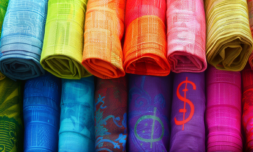The legislation could mark a watershed moment for sustainability in fashion. But can it do enough to change things?
California is on the verge of passing a groundbreaking bill that could reshape the fashion industry’s environmental footprint. The Textile Recycling Bill (or SB 707), is currently advancing through the state legislature, and aims to hold fashion brands accountable for the waste they produce.
SB 707 has already passed recent California Assembly Natural Resources Committee vote 9-3, and will establish a ‘robust’ extended producer responsibility program.
This would require producers across the industry to implement and fund a program to facilitate the reuse, repair, and recycling of clothing and textile fibres.
As the world grapples with the escalating climate crisis, this legislation represents a potentially transformative moment for sustainable fashion. But while advocates are celebrating, sceptics question whether it goes far enough to address the industry’s deeply ingrained issues.
The Textile Recycling Bill mandates that fashion brands selling in California must establish and participate in comprehensive textile recycling programs.
My landmark textile-recycling bill has passed the California Assembly National Resources Committee. The Responsible Textile Recovery Act of 2024 will create a statewide program to develop previously untapped or underutilized upcycling and recycling of clothing and fiber markets.… pic.twitter.com/s9Ih2gTYzQ
— Senator Josh Newman (@JoshNewmanCA) July 2, 2024
This legislation comes in response to the alarming statistics surrounding fashion waste: the equivalent of one garbage truck full of clothes is burned or sent to landfill every second globally.
Under the bill, companies will need to implement take-back schemes, ensuring that consumers can return used garments for recycling or repurposing.
Additionally, brands will reportedly be incentivized to use more sustainable materials and reduce the volume of waste they generate.
Supporters of the bill, including environmentalists and fashion activists, argue that this approach could significantly mitigate the environmental damage caused by the industry.
Senator Josh Newman, who spearheaded the reform, is among those celebrating what could turn out to be a watershed moment for sustainable fashion and textile production.
Calling it a ‘landmark, first-in-the country’ piece of legislation, Newman said he was ‘very proud of the thoughtful and thorough work, involving stakeholders at every point of the value chain, that has gone into SB 707 to produce a bill that will have an immensely positive impact on our state and on the environment.’



















